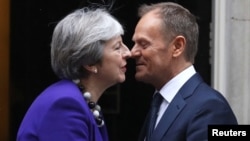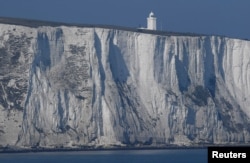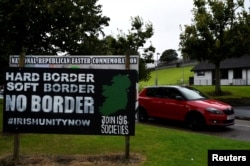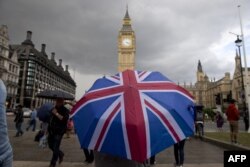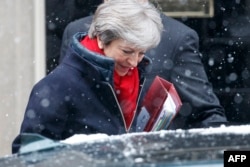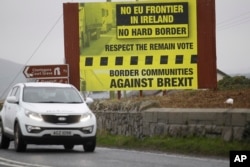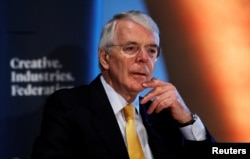Britain is facing decision time.
When it exits the European Union in 13 months' time, does it want to remain in a customs union and single market with its most important trading partner, allowing goods to move across borders freely, or not?
Irish border issue
Will a so-called "hard border" once again scythe the island of Ireland with tariffs imposed on goods and passports have to be inspected at heavily-fortified security checkpoints — or will the Irish north and south be able to move themselves and their goods without hindrance between the two halves?
After months of ducking and diving, semantics, talk of bespoke agreements, rebuffs and tantrums and public maneuvering by politicians in London and Brussels, mimicking sumo wrestlers focused on intimidation, the Brexit negotiations appear to be now in the middle of a defining moment.
The publication by EU negotiators Wednesday of a voluminous draft legal document meant to formalize an almost-completed divorce deal struck between London and Brussels in December has prompted a furious rejection from the British government, risking possible near fatal delay to planned second-phase talks on Britain’s future trading relationship with the bloc.
Angry pro-Brexit Conservative lawmakers accused EU negotiators of wanting to land grab Northern Ireland and transform it into an exclave of the bloc — an accusation triggered by Brussels’ defining a “backstop” arrangement for the Irish border whereby Northern Ireland would remain in the EU’s customs union, abide by its regulations and laws allowing for tariff-free trade and free movement of people on the island on Ireland.
Speaking in parliament Wednesday, British prime minister Theresa May slammed the proposal saying it would in effect create a border between the rest of Britain and Northern Ireland.
“The draft legal text the commission have published would, if implemented, undermine the UK common market and threaten the constitutional integrity of the UK by creating a customs and regulatory border down the Irish Sea, and no UK prime minister could ever agree to it,” she said in one of the most fiery Brexit clashes to date between London and Brussels.
'Backstop solution'
And with already acrimonious relations deteriorating fast between the British and European Commission, which has been mandated by EU member countries to negotiate with Britain, London has now told the EU that it will withhold the multi-billion dollar Brexit divorce bill it agreed to also in December, until Brussels backs down on the “backstop” solution for avoiding a hard Irish border.
For EU negotiators, their “backstop” solution for the island of Ireland merely formalizes what the British agreed to in December - no hard border between Northern Ireland and the Irish Republic — something Dublin and the majority of the Northern Irish are demanding.
The British have failed to come up with a solution of their own for a frictionless border — something all sides are committed to, fearing that reestablishing a customs border could well risk a violent backlash from die-hard Irish Republican Army militiamen and re-ignite sectarian hostilities.
EU chief negotiator Michel Barnier is calling on the British government to come up with alternatives for the border. He says the text should have come as “no surprise” and was just a legally-worded assessment of what had been agreed in the December negotiations.
May will reiterate the threat not to pay a divorce bill in meetings Thursday with Donald Tusk, president of the European Council, in which she will brief him on the outlines of a speech she is due to make Friday on what Britain wants in terms of a future trade deal with the EU.
Unclear trade position
Few observers believe May’s Friday speech will do much to clear the air or clarify the British government’s position on exactly what it wants in terms of a future trade deal with the EU — or at least one that Brussels could agree to and persuade all the 27 EU member states to endorse.
May is in an almost impossible position, say analysts, having to try to negotiate not only a deal with Brussels but to negotiate one that can be agreed by both wings of her party fractured between ultra-Brexiters, who are opposed to Britain remaining in a customs union, and those who want to retain close ties to the EU.
With tempers fraying, former Conservative Prime Minister John Major has savaged the May government’s handling of the negotiations, eviscerating her decisions and warning that Britain was heading for serious “economic self-harm.”
In a speech Wednesday that infuriated Conservative Brexiters, he remarked that it was the government’s duty in line with the 2016 referendum result to “negotiate a Brexit, but not any Brexit, not at all costs and certainly not on any terms.” Like a former Labour Prime Minister, Tony Blair, he wants a second Brexit referendum.
Major said it wasn’t credible to expect to leave the single market and customs union and escape the rules and regulations that go along with membership, while at the same time seeking a la carte access to European markets, which May and her ministers appear to want. “Our aims have to be realistic,” he said.
The months-long, high-risk and generally testy negotiations between London and Brussels have had plenty of flare-ups before, but each time clashes occur the odds rise on Britain crashing out of the EU with no trade deal struck — an outcome which would seriously damage Britain’s economy, according to impact studies by Britain’s Treasury department.
For commentator Iain Martin the clashes are illustrating a wider truth about the incompatibility of Britain and the EU. Writing in The Times Thursday, Martin remarked: “The EU is at root a relentless network of treaties and legal codes, geared towards integration and perhaps federation. The British governing system has evolved differently; it is a workable fudge that hardly makes sense at all.”




